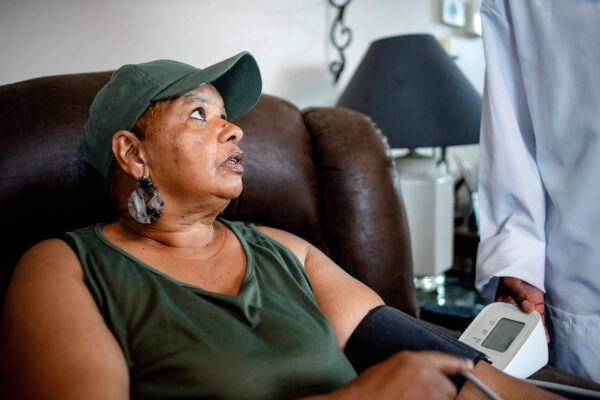Biden Administration to Launch ‘Game Changing’ Plan to Help Sickle Cell Patients Get Breakthrough Treatment
The Biden administration is working on making treatments for sickle cell more accessible for Americans most impacted by the disease.
Last year, the U.S. Food and Drug Administration authorized breakthrough gene therapies to tackle the disease that disproportionately affects people of color, more specifically Black Americans. According to the Centers for Disease Control and Prevention, sickle cell happens in 1 in 365 Black births, and about 100,000 people are living with it.
Although the announcement sparked positive reactions, advocates raised questions about the affordability of the treatment, which costs a fortune. According to the American Society of Hematology, living with sickle cell is expensive, and even those with private insurance have to invest nearly an estimated $2 million on treatments throughout their life. Overall, it costs a whopping $3 billion a year to treat the disease.
“I’m excited about the therapies. However, we are still concerned about cost and accessibility. Who has access and how will the cost be covered for a drug that’s over a million dollars,” Andrea Hall of Shak’s Hope previously told Atlanta Black Star.
The pharmaceutical and biotech companies associated with the treatment reportedly said they are looking into contracts for individuals with Medicaid — the government program that covers prescription and therapeutic medical expenses for patients enrolled. Secretary of Health and Human Services Xavier Becerra outlined the “game-changing” strategy to address the accessibility issue on a Jan. 31 call with reporters.
“HHS is using every tool available to us to increase access to high-quality, affordable health care and lower health care costs,” Becerra said in a statement. “Many of the more than 100,000 Americans with sickle cell disease face difficulty accessing effective health care and groundbreaking treatments. While medical advancements bring us closer to cures, too many individuals with sickle cell disease and their loved ones still face challenges obtaining the care they need.”
The administration plans to use a Cell and Gene Therapy Access Model (CGT), which strives to improve health outcomes and combat high prescription costs. It’s slated to begin in January 2025.
“Our goal is to work with manufacturers so that we can make the drug that they’ve just produced available and that way, they can sell it,” Becerra later explained during a phone call with reporters. “What we’ll do is work with the states because more than half of the population that has sickle cell disease is enrolled in Medicaid.”
To be eligible for gene therapy to treat sickle cell disease under the model currently, a person must have a documented medical diagnosis of sickle cell disease, be enrolled in Medicaid or Children’s Health Insurance Program in a state participating at the time of therapy and receive a gene therapy from a participating manufacturer. Any additional criteria will be established through the negotiations.
Becerra said the administration plans to work with states and obtain a “collective bargaining power” as leverage in negotiations with manufacturers.
“Participating states will then decide whether to enter into an agreement with manufacturers based on the negotiated terms and offer the agreed-upon standard access policy in exchange for rebates as negotiated by [the Centers for Medicare & Medicaid Services],” the statement said.
Representatives for CMS told Atlanta Black Star that manufacturers will have to meet the same manufacturing standards as required by the FDA, and there will be no compromises in the quality of the gene therapies as a result of this model.
If the negations are successful, they could potentially be used for other diseases moving forward.
“We’re going to hopefully give Americans who have suffered from sickle cell disease, hope for a better future. We’re going to give taxpayers hope that we can keep the price of a very innovative but expensive medicine down and hope for the manufacturers that they will actually have a marketable product that they can make sure reaches the population that really needs it,” Becerra said. “It should be a win-win for everyone.
As far as what the plan means for patients who don’t qualify for Medicaid, CMS representatives say insurance companies may be able to learn from the administration’s model.
Atlanta Black News Editor Nyamekye Daniel contributed to the reporting of this story.

